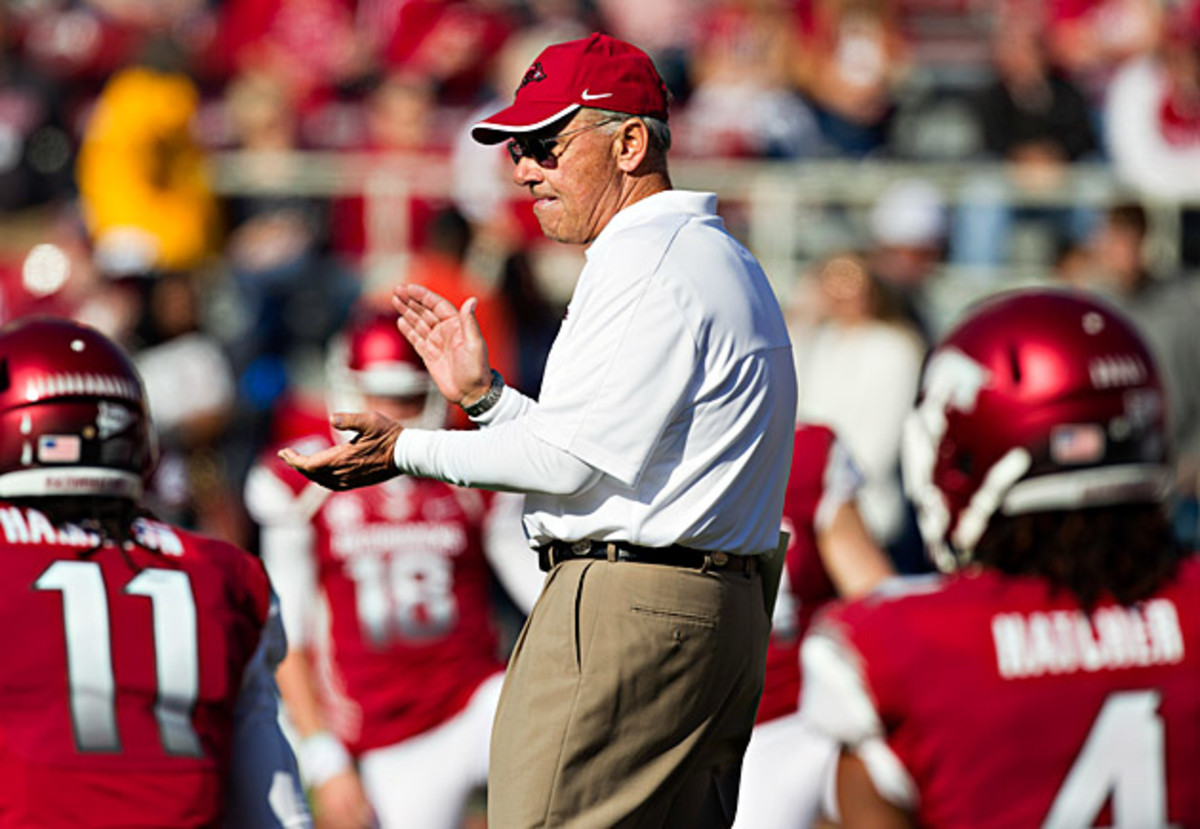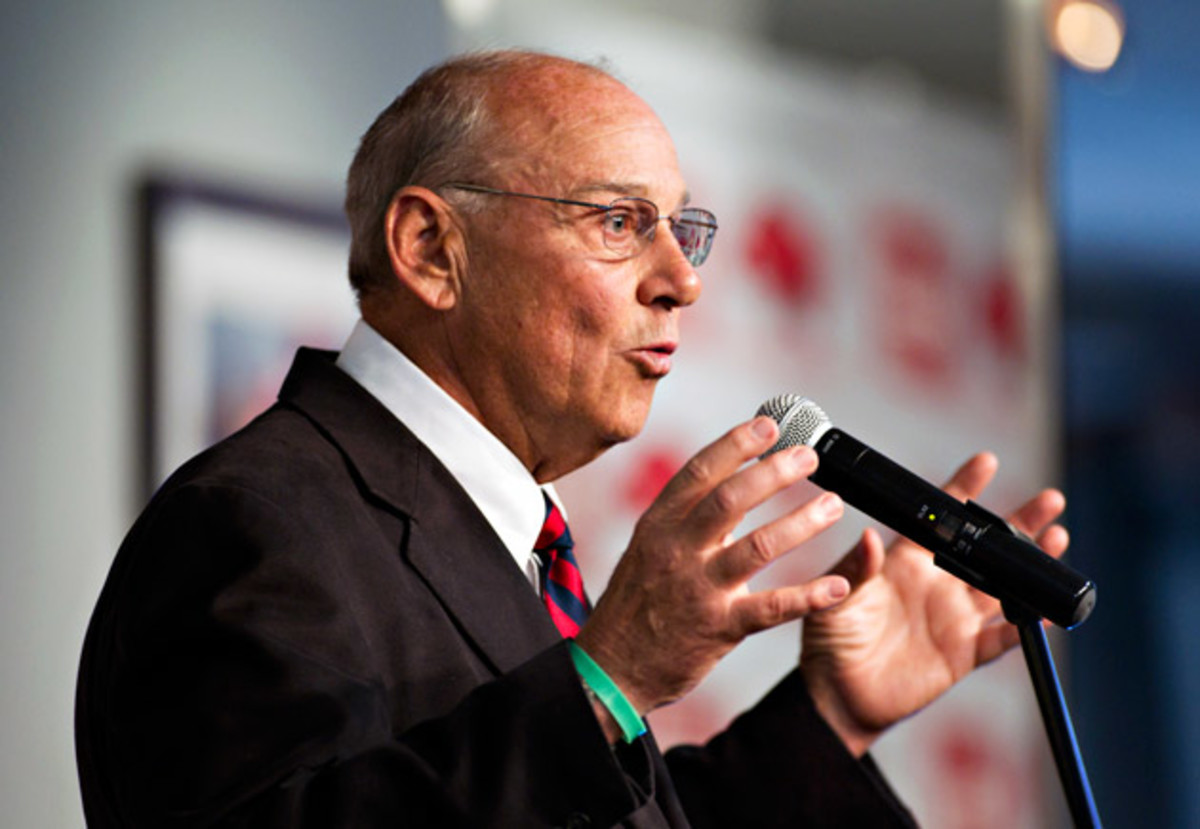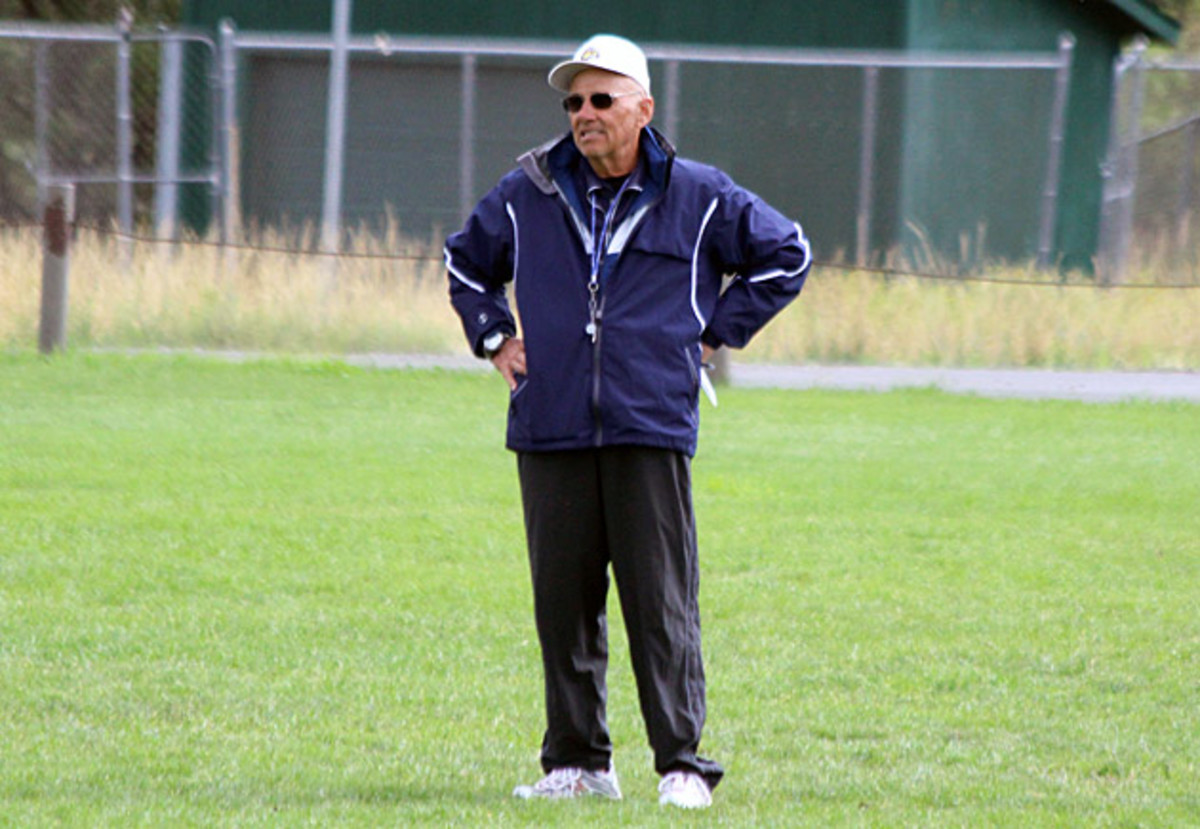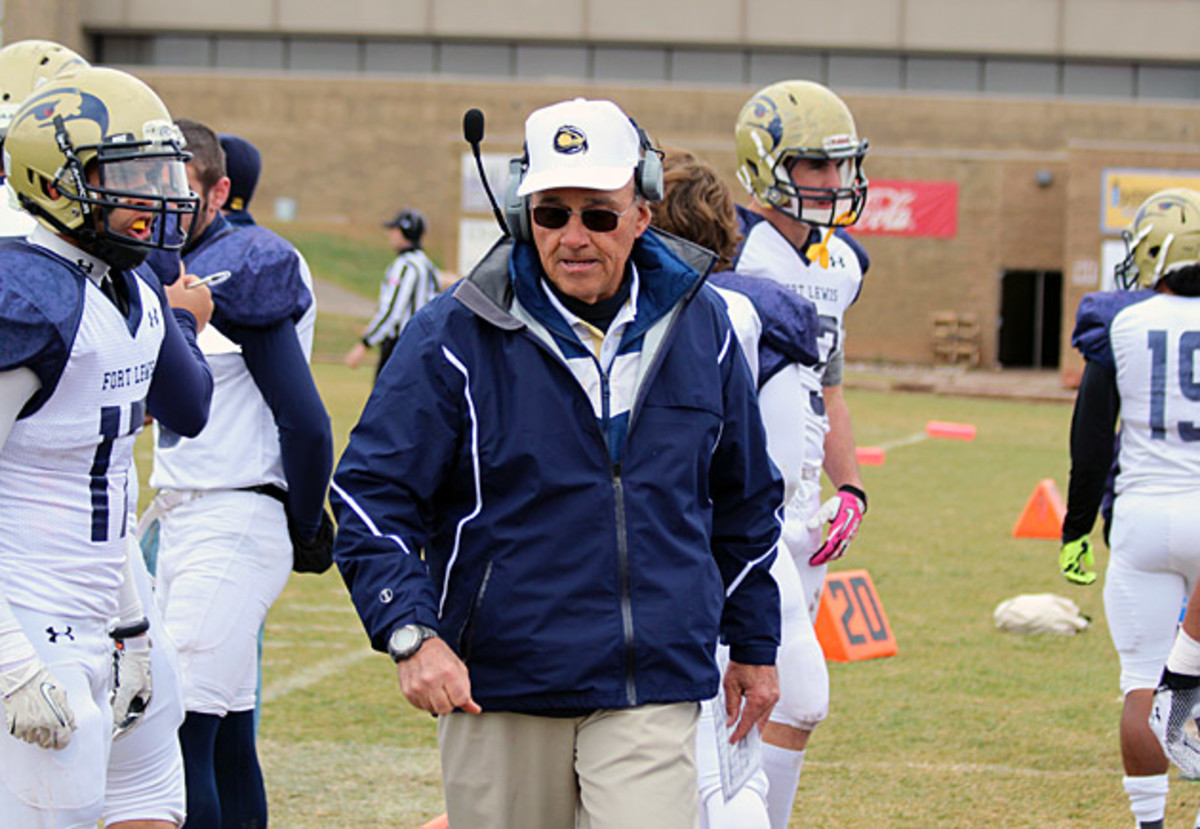John L. Smith's latest adventure: Coaching at Division II Fort Lewis

DURANGO, Colo. -- The first time John L. Smith attended a budget meeting at Fort Lewis College, a small liberal arts school nestled among the mountains in the southwest corner of Colorado, his athletic director said 13 words that caught Smith so off guard he almost fell out of his chair.
“Your budget is about $400,000. You have to raise a quarter of it.”
What?
Smith, 65, was once a marquee name in big-time college football. He made head coaching stops at Louisville, Michigan State and Arkansas, among other programs, and is one of just 19 men to take three different schools to bowl games. Known as much for his eccentric personality as his spread offense, he did not expect this when he agreed to lead a Division II team.
“I have to raise a quarter of it?” Smith says. “I had never heard of that in my life, of the head coach doing that. I asked, ‘Where are people who do the fundraising? And they told me, ‘You’re the people.’
“My first thought was, ‘Oh Lord, what have I got myself into?’ I’m not very political. I have a tendency to piss people off and now I have to be the fundraiser? Really?”
Two years into the job, Smith says there have been a lot of reallys.
Fort Lewis (enrollment: 3,800) plays in the Rocky Mountain Athletic Conference, a league dominated by track and field talent with a few football powers sprinkled in. The Skyhawks have never been one of them. Fort Lewis has one conference title in program history, in 1984, as an NAIA school. The year before Smith arrived it went 0-10. From 2008-12 it went 10-58, including 7-38 in league play.
On Oct. 11 Fort Lewis shocked No. 2 Colorado State-Pueblo thanks to the performance of junior receiver Jordan Gillen, who caught a touchdown pass and threw another when the Skyhawks ran a flea flicker with 3:46 remaining. When the clock wound down on a 23-22 Fort Lewis win, the players had no idea how to celebrate. Puzzled fans in the stands turned to Smith’s wife, Di, and asked, “What do we do now? Do we go on the field? Is that allowed?”
“It’s a program without tradition,” Smith says. “It’s been a total education for everyone involved.”
Fort Lewis plays its final game of the season on Saturday when it hosts Chadron State. The playoffs are already out of reach, as the Skyhawks have dropped three of their last four to fall to 3-7. Of all the adventures Smith has taken -- skydiving, running with the bulls in Spain, climbing Mount Kilimanjaro, flying a T-38 Talon jet trainer -- signing up to a coach a Division II team might be the craziest. In the end, it might also be the most rewarding.
*****

Smith is probably best known for his head coaching stint before this one, when he took over at Arkansas after Bobby Petrino was fired in April 2012 following a motorcycle accident and the revelation of his affair with a woman who worked in the athletic department. Smith had been hired at Weber State, his alma mater, following the ’11 campaign, but left after spring football and went back to Arkansas, where he had once been an assistant under Petrino.
The return to Fayetteville did not go well. The Razorbacks, a preseason pick to contend for a BCS berth, finished 4-8. Smith was let go -- he had signed only a 10-month contract -- and Arkansas went on to hire Bret Bielema.
Almost immediately, Fort Lewis athletic director Gary Hunter saw an opportunity. Hunter held the same position at Idaho in 1989, when he hired Smith for his first head coaching job. Dene Kay Thomas, now the president at Fort Lewis, worked as an associate dean at Idaho at the same time. They offered Smith the position and he accepted on Jan. 16, 2013.
“I happen to be an adrenaline junkie myself,” Hunter says. “I knew John’s personality, how competitive he was and how much he enjoyed a good adventure. That was part of my sales pitch: Boy, do I have an adventure for you.”
“They told me, ‘We can’t pay you anything, but we’ll get you a year-round pass to the resort,’” Smith says. It was a fitting offer for someone who hopes to come back “as a ski bum in my next life.”
The gig had other advantages, too. Smith has always been drawn to the West. When former boss Dennis Erickson left Washington State for Miami before the 1989 season, Smith, who grew up on a farm in Idaho, did not follow because he didn’t think he would fit in. “My cowboy boots wouldn’t have worked in Florida,” he says.
Though he’s at an age when many men enjoy golfing and spending time with their grandchildren, retirement was not an option. Smith tried that, in 2006, after he was fired from Michigan State. He quickly learned sitting still was not his strong suit.
Had he waited around, Division I assistant offers likely would have flooded in. But after the mess in Arkansas that included a bad season -- Smith says he is still close with Petrino -- and a $40 million bankruptcy filing (he was discharged of debt in a settlement last September) that dragged out painfully and publicly over several months, Fort Lewis felt safe. “This was a soft place to fall,” says Di, his wife of 44 years. “We needed to move on from Arkansas, and this timing was right. It’s a good challenge for him.”
She takes a deep breath, closing her eyes and shaking her head with a smile.
“It’s another great adventure. Why not?”
*****

Like most football coaches, Smith loves recruiting the South. Players there are “just different,” he says. The region that treats football as a religion regularly churns out prospects bigger, faster and tougher than the rest. Years ago, Smith stepped into the Alabama home of a top player and took note of family photos adorning the mantel. Hung above the fireplace, in a spot usually reserved for a portrait of Jesus, was another man deemed worthy of worship: Former Alabama coach Bear Bryant.
In the South, players like when coaches holler and yell and stomp their feet. “With Southern players, you can run ’em through a wall, cuss ’em up and down, beat ’em with a stick and they’re like, ‘Coach, I love it, give me more,’” Smith says. But out West, especially at smaller divisions, players wilt at even a hint of criticism. Problem is, Smith only knows how to coach one way.
Loud, boisterous and full of one-liners, Smith has become almost a caricature of himself. His infamous halftime rants -- found easily on YouTube -- made players at Fort Lewis wonder what they had gotten themselves into. “We all saw the videos,” backup quarterback Trevor Bonifasi says. “At first there were lots of questions and confusion about why he was at our school. After getting to know him, I’d say those videos are a pretty accurate snapshot of him. He’s not mellow, that’s for sure.”
At team dinner the night before Fort Lewis’ matchup with Colorado Mesa on Oct. 25, Smith tells an assistant this level is, “all about spoon-feeding.” Most players at Fort Lewis are not football junkies, and they marvel at Smith’s knowledge of the tiniest details that can make a big difference.
“Coach loves his special teams, and, man, we’re learning a lot,” Gillen says. “I thought on kickoffs you kicked the ball, ran down the field and tackled somebody. I didn’t know there were so many ways to do it.”
The night before the Mesa game, Smith gathers the special teams in a Holiday Inn conference room and shows video of a kickoff return, explaining how close the Skyhawks have previously come to scoring. “We’re gonna break one, gentlemen,” he tells his players. “We’re due.” Fort Lewis does exactly that the next night, taking a kick 75 yards for a touchdown in a 28-20 win.
Players gush about Smith’s ability to break down the game. Coaching at a Division II school with no professional prospects has made him a better teacher, Smith says. He adds it could also mark the beginning of a slow descent into insanity. He seems to be only half kidding.
Says Smith, after a long sigh: “This isn’t exactly the SEC.”
*****

On a long, windy trip along Red Mountain Pass -- one of the most dangerous highways in the world -- toward Grand Junction, Smith points out the ski resort formerly known as Purgatory, a popular cold-weather vacation destination. Now called the Durango Mountain Resort, it’s a stop on the Fort Lewis recruiting tour. Also included is the Durango Train, which runs between Durango and Silverton and staked its claim to fame with an appearance in the film Butch Cassidy and the Sundance Kid. Not included in the pitch: A conversation about the road trips.
Transportation has been one of the most dramatic changes for Smith during this experience. At Division I you charter planes. At Division II you charter buses. The longest trip of this year was the first, when the Skyhawks drove 18 hours to UC-Davis for a 52-17 thrashing on Sept. 6. The trip got longer on the way home when the bus broke down for a few hours.
“Coach doesn’t sit around and wait for other people to do stuff for him,” says senior offensive lineman Arthur Ray, rolling his eyes. “When our bus broke down, coach walked into AutoZone with the driver. He was going to fix it himself.”
Long bus rides are just one of the realities of a tight budget. The NCAA caps scholarships for Division II programs at 36, though they can be split among multiple players. Fort Lewis has just 29, meaning most kids pay to play. Forget having a courtesy car; there’s not even courtesy parking. On more than one overnight trip campus police have ticketed Smith’s vehicle. There are no apparel contracts. Smith’s wardrobe most days is a brand mash-up: Nike shoes, Russell Athletic shirt, Under Armour hat. Players buy their own cleats. “I get my shirt and shorts and I think I’m spoiled,” Gillen says. “We don’t really have donors. If anyone wants to send us money, it’s welcome.”
The recruiting budget is practically nonexistent. Last offseason defensive line and strength and conditioning coach Joe Morris spent weeks driving around Colorado, New Mexico and Arizona, crashing on friends’ couches and sleeping in his car trying to track down overlooked talent. There are just three direct flights into Durango -- from Denver, Dallas and Phoenix -- so Smith has emphasized recruiting those areas. At one point Morris picked up three prospects in Phoenix and drove them seven hours to Durango for a campus visit. While Fort Lewis remains a tough pitch, Smith’s pedigree gives it an edge. “Now,” Morris says, “I finally have something to sell.”
Unlike at Division I, where football coaches are often isolated from the rest of the athletic department, Smith interacts with coaches and administrators on a daily basis. After all, the coffee pot and best printer are located outside Hunter’s office. The locker room is too small for everyone to watch film together, and hardly a plush hangout. Last year Smith and Hunter bought a big-screen TV so the kids would have somewhere to congregate, paying for it out of their own pockets.
“There are high schools in Texas,” Smith says, “with more resources than us.”
Still, Smith believes he can build a winner. It just might take longer than anticipated.
“When I first got here, I thought by the end of year two, we’d have this thing turned around,” he says. “We were way further behind than I realized. I’m not a patient person. But I’m learning to be.”
*****

Midway through the second quarter at Mesa, Fort Lewis defensive back Theo Chambers gets mixed up with an opponent and some recess-level shoving ensues. A flag is thrown and Smith screams at Chambers: “Get your butt off the field!”
Smith grabs Chambers’ collar and pulls him so close their noses practically touch. Smith’s face turns a deep shade of crimson and his eyes bulge. “Keep your mouth shut!”
When a teammate interjects to explain the Mesa player said something degrading, Smith waves him off. But after conferring with an official and determining that the penalty was not on Chambers, Smith jumps into the huddle and hollers, “I apologize! I apologize!” He wraps his arm around his defensive back, tilting his head toward Chambers’ ear to whisper to the junior that he still loves him. Chambers slaps Smith’s back before glancing at a teammate and shaking his head. He looks bewildered.
The next day, Smith says he has wondered if he’s too intense for this level.
“Maybe Division II doesn’t need someone like me, who’s so demanding,” he says. “Maybe they need someone who’s nurturing. I’m not sure I’m the right one for that.
“I don’t know that I’ve ever done that before, question if I’m being too hard on a player. When I was at Utah State [from 1995-97], one night we didn’t have working lights on the practice field, so I told everyone to go get their cars, point them at the field and turn on their lights. If I did that here, people might quit. Maybe I need to relax.”
Asked if he’s capable of relaxing, Smith sheepishly admits he’s probably not. But it’s a spirit Hunter loves.
“This is my fourth year in Division II and I can tell you, there’s quite a few screamers, so John’s not alone,” Hunter says. “When you’re a competitor, it doesn’t matter if you’re coaching the New England Patriots or the Fort Lewis Skyhawks. We love that about him.”
Smith is learning to love Fort Lewis, too, despite all of the headaches that come with the job. The win over Pueblo gives him reassurance the Skyhawks, and their self-image, are trending up. Winning a conference title seems ludicrous given the lack of resources, but Smith tells his players it’s possible. “If you don’t talk about being a champion you’re never going to get there,” he says. “No matter how far out it is, I believe in talking about it now. It’s an evolution.”
Still, many often wonder why he took a Division II gig in the first place. In 2013, when Jim Rome heard about Smith accepting a position at tiny Fort Lewis, the radio show host asked a question many fans around the nation likely did: “Is he crazy?”
Looking back, Smith smiles slyly. “Yes. I’ve always known I am.”
